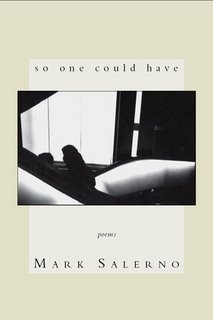A heaven beside me is
revolving, a planet a window
a façade of confusion.
Poor landscape
a mouse with a pipe
playing electric ocarina
isolates my psyche
what an uncanny picnic
this sparkling silver air.
Like a first date or
skyscraper juggling a desert
there is a beauty to ice that
only a statue understands
O silence,
how we must
squeeze
restaurants
of their conversations.
Wednesday, January 17, 2007
List of Dances
Dominican merengue mania
Cambodian psychedelia
Gypsy marching band
French-Algerian rai
Balkan electrofolk
Flamenco thrash
Mexican cumbia
Mongolian punk
Ethiopian funk
Last call stagger
Cambodian psychedelia
Gypsy marching band
French-Algerian rai
Balkan electrofolk
Flamenco thrash
Mexican cumbia
Mongolian punk
Ethiopian funk
Last call stagger
Who is your celebrity lookalike? This is kind of funny. Whoa…not so funny. I don’t want to look like Carson Daly. TRY IT.
Between Reason and Desire

A review of
So One Could Have by Mark Salerno
ISBN 1-888996-86-2
In Mark Salerno’s latest book of poetry, So One Could Have, the
details pile up like the moments of an extraordinary day. What we have in this book is a casually scientific exegesis on the passage of time. In lesser hands this tall order might have become an exercise in tedium, but Salerno pulls this off in a most deceptively simple, and likable way.
Any given day, for most denizens of planet earth, is a harried series of moments. The challenge is to not only move through life with aplomb and accomplish something but also to add up these moments and decipher any supposed meaning. The relative aspect of human existence aside, good art is unflinchingly good at representing some facet of communal reality—without moralizing. This said reality may be represented as completely irrational and fantastic, banal and predictable, or somewhere uniquely in between, the skill lies in recording it faithfully and then stepping aside. Salerno is a subtle master of stepping aside. One thing that makes this book so interesting is Salerno’s use of caesura.
I used to be feeling now I am a penny arcade
(from “Small World,” p. 27)
These are poems that use monolithic pauses to accentuate and ground. Nearly after each observation comes a forceful void, which outlines the music of these lines like a Mondrian. Not that these poems are rigid or forced, they are in fact very fluid and faithful to the seemingly liquid quality that consciousness has. In “Pink’s” (p. 59) Salerno states
In seeing one thing we probably see many
wherein I gathered all my passing moments
to reconstruct a bibelot and a merely stupid
O befuddled longing O track of wonder
Salerno does seem to see many things at once and his poetry allows the reader to experience a similar luxury. This book is a photo lab of discrete stock-piled images. Salerno seems to instinctively know how to post-modernly question what most have accepted as foundations of Western humanism with the nonchalance of sleight-of-hand man.
we awake as good as another from dreams
I hate that Picasso and Newton screwed up
science and the Renaissance was a mistake
I love the light before the blue and the
time it takes to be here it is the role
(“Small World,” p. 27)
Salerno’s reticence is not overpowering, however. It seems to be more of beginning than an ending for him. His dispassionate attitude seems to be more of a harnessing of power and a summing up rather than a giving up or a defeat. These poems lie somewhere between despair and celebration in a middle ground that is somewhat mysterious. The inversion of thought and image in some of Salerno’s best lines lends his poetry in this volume a somewhat cinematic quality.
she said nice little town you got here
sheriff with eyes on the stranger logic
wanted the big hit the big grab and skip
over the border it’s a helluva country
to be modern in cottonwoods and damp cuffs
a building falls down but the sky stays put
(“Coda,” p. 69)
There is a disheveled beauty in the immediacy of this book, but the downside of that is sometimes this reviewer felt perhaps some of these lines rely a bit too much on the journalistic impulse. Usually, at these moments in So One Could Have, however, the poet’s idiosyncratic method serves to bring the reader quickly back around—whatever slack or uninteresting strophes are compensated for by another apt turn of phrase which surely follows.
This ebb and flow in Salerno’s new book provides a real sense of what is true of human consciousness. Existence entails a constant process of redefinition. This book achieves that superlatively.
Subscribe to:
Comments (Atom)